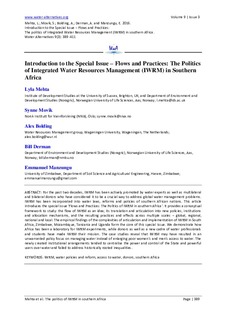| dc.contributor.author | Mehta, Lyla | |
| dc.contributor.author | Movik, Synne | |
| dc.contributor.author | Bolding, Alex | |
| dc.contributor.author | Derman, Bill | |
| dc.contributor.author | Manzungu, Emmanuel | |
| dc.date.accessioned | 2018-08-02T09:28:55Z | |
| dc.date.available | 2018-08-02T09:28:55Z | |
| dc.date.created | 2016-11-28T11:43:53Z | |
| dc.date.issued | 2016 | |
| dc.identifier.citation | Water Alternatives - An interdisciplinary journal on water, politics and development. 2016, 9 (3), 389-411. http://www.water-alternatives.org/ | nb_NO |
| dc.identifier.issn | 1965-0175 | |
| dc.identifier.uri | http://hdl.handle.net/11250/2507244 | |
| dc.description.abstract | For the past two decades, IWRM has been actively promoted by water experts as well as multilateral and bilateral donors who have considered it to be a crucial way to address global water management problems. IWRM has been incorporated into water laws, reforms and policies of southern African nations. This article introduces the special issue 'Flows and Practices: The Politics of IWRM in southern Africa'. It provides a conceptual framework to study: the flow of IWRM as an idea; its translation and articulation into new policies, institutions and allocation mechanisms, and the resulting practices and effects across multiple scales – global, regional, national and local. The empirical findings of the complexities of articulation and implementation of IWRM in South Africa, Zimbabwe, Mozambique, Tanzania and Uganda form the core of this special issue. We demonstrate how Africa has been a laboratory for IWRM experiments, while donors as well as a new cadre of water professionals and students have made IWRM their mission. The case studies reveal that IWRM may have resulted in an unwarranted policy focus on managing water instead of enlarging poor women’s and men’s access to water. The newly created institutional arrangements tended to centralise the power and control of the State and powerful users over water and failed to address historically rooted inequalities. | nb_NO |
| dc.language.iso | eng | nb_NO |
| dc.publisher | Water Alternatives Association | nb_NO |
| dc.relation.uri | http://www.water-alternatives.org/index.php/alldoc/articles/vol9/v9issue3/337-a9-3-1/file | |
| dc.rights | Attribution-NonCommercial-ShareAlike 3.0 Unported (CC BY-NC-SA 3.0) | * |
| dc.rights.uri | https://creativecommons.org/licenses/by-nc-sa/3.0/ | * |
| dc.title | Introduction to the Special Issue – Flows and Practices: The Politics of Integrated Water Resources Management (IWRM) in Southern Africa | nb_NO |
| dc.type | Journal article | nb_NO |
| dc.type | Peer reviewed | nb_NO |
| dc.description.version | publishedVersion | nb_NO |
| dc.source.pagenumber | 389-411 | nb_NO |
| dc.source.volume | 9 | nb_NO |
| dc.source.journal | Water Alternatives - An interdisciplinary journal on water, politics and development | nb_NO |
| dc.source.issue | 3 | nb_NO |
| dc.identifier.cristin | 1404989 | |
| dc.relation.project | Norges forskningsråd: 213624 | nb_NO |
| cristin.unitcode | 7464,30,22,0 | |
| cristin.unitname | Vann og samfunn | |
| cristin.ispublished | true | |
| cristin.fulltext | original | |
| cristin.qualitycode | 1 | |

